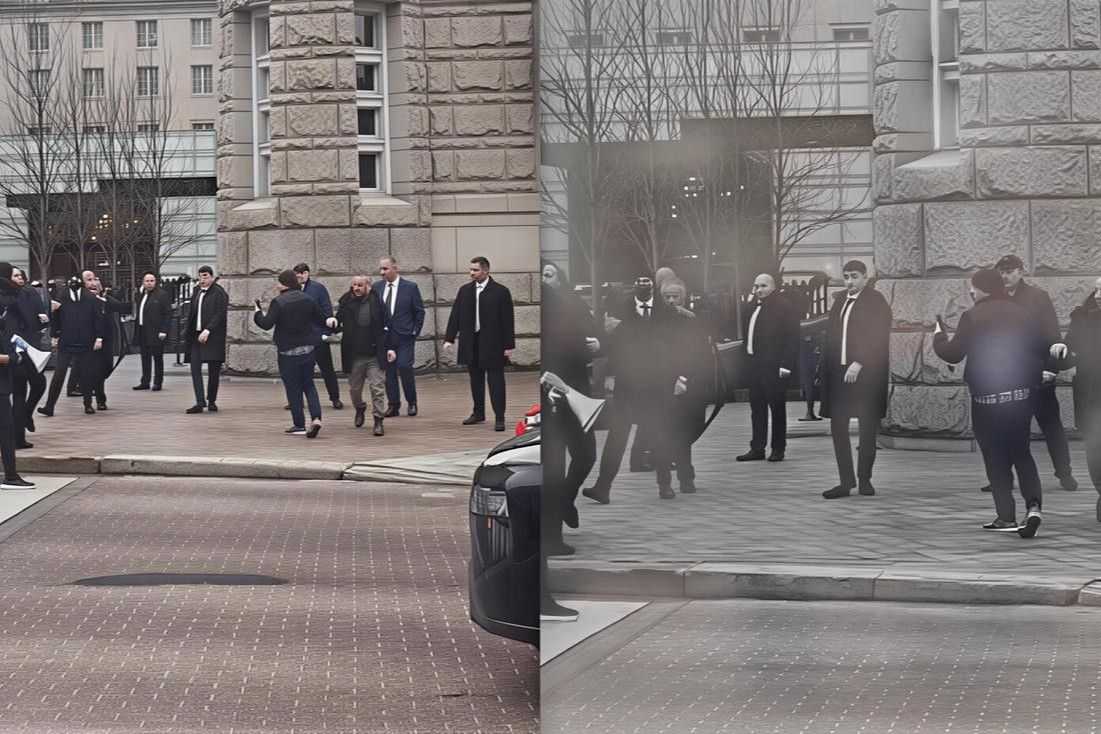
Four years since the coronavirus pandemic began, Azerbaijan’s land borders remain closed to all civilian traffic. While officially this is to prevent the spread of the coronavirus, a number of theories exist regarding the real reason behind the measure.
In the spring of 2020, Azerbaijan followed the example of many other countries, closing its land borders to prevent the transmission of the coronavirus, alongside a host of other preventive measures. Later the same year, the Second Nagorno-Karabakh War took place, in which Azerbaijan gained control of territory in Nagorno-Karabakh. As I watched from Ankara, it was clear that dramatic changes were afoot in the country.
Four years later, those changes have taken firmer shape.
After the first diagnosis within the country in late February in a citizen travelling from Iran, Azerbaijan announced that its border with Iran would close, and borders with other countries were closed later. But as the government has tightened its hold on power in the aftermath of its victory in the war, the closure of land borders has persisted long after all other COVID-prevention measures have been dropped, appearing to move from ‘special quarantine regime’ to just part of the existing regime.
It is clear that the government believes it benefits from the measure, as its impact on Azerbaijan’s economy, tourism, and people’s day-to-day lives is sufficiently damaging that it must be earning its keep.
The official reason given remains the fight against COVID-19, but that excuse has become laughable: in Azerbaijan, masks are no longer mandatory, nobody cares about vaccine certificates, and the days of text message permits have faded into distant memory. So what does the government stand to gain in actuality?
On social media, theories abound, as the Azerbaijani government appears dedicated to preserving a mystery around its processes and priorities.
One leading theory is that Azerbaijan’s national airline — AZAL —has sought to maximise its profits. The company is indirectly owned by the ruling Aliyev family, and other airlines are broadly excluded from Azerbaijan’s airspace due to high taxes on foreign airlines. When the land borders were closed, AZAL was granted an effective monopoly on travel to Azerbaijan, and consequent free reign to set the prices of its tickets as it saw fit. And the measure seems to have worked: its vice president confirmed in February 2023 that the company had ended the previous year with a net profit for the first time in its history.
Others have put forward the idea that the border closure is straightforwardly directed at stopping migration: an attempt to stop the repatriation of Azerbaijani migrants from Russia who would be an economic burden on the government, or obstruct Russians fleeing Putin’s war. One social commentator even proposed that the government’s intention was to keep Azerbaijan’s people from fleeing ‘the next war’.
Emin Shaig Ibrahimov, an Azerbaijani former diplomat, told me that ‘we can only speculate’ as to why the government has kept the borders closed for so long, but that it comes down to ‘pure brute force’.
‘To freely come and go from the country is a fundamental right of citizens, it is also established in the constitution. In the current situation, nothing can justify the land borders’ closure’, said Ibrahimov. ‘Keeping the borders closed has become one of the symbols of the total deprivation of rights of the Azerbaijani people, systematic oppression and humiliation by the authorities.’
I also asked a lawyer, Emin Abbasov, for his understanding of the reason for the borders’ extended closure, and to clarify whether the measure had any legal basis.
Abbasov suggested that economic benefits are one part of the puzzle.
For example, by preventing citizens from spending their money in neighbouring countries, that money remained within Azerbaijan. While the number of tourists travelling overland will have fallen, the government prefers tourists with the financial means to enter the country by air.
A change in customs rules also increased the government’s profits. In August 2020, Azerbaijan’s government lowered the value of products that citizens could bring into the country without paying import taxes from $1000 to $300. In combination with the greater degree of control over physical and financial imports at air borders, the theory appears to have merit.
But Abbasov believes that, while financial benefits are a motivating factor, the aim is fundamentally political.
‘The main goal is to normalise and consolidate a situation where the state uses its power in an unrestricted and irregular manner, as well as without reasonable justification for the use of force,’ he said.
He highlights comments by Azerbaijan’s Prime Minister Ali Asadov, who, by way of explanation for the border closure’s extension in March, stated that ‘this is my authority as the Prime Minister, I signed it’.
Abbasov argues that such statements make clear that the state is operating with a worrying disregard for checks, balances, and basic accountability.
He notes that despite provisions in Azerbaijan’s constitution aimed at establishing robust limits over executive authority, a combination of amendments and wilfully ignoring constitutional limits has led to the government’s power being essentially unchecked.
‘Sections pertaining to freedom of movement, human rights protections, and the jurisdiction of the parliament, as enshrined in the Azerbaijani constitution, indicate that the executive branch may only curtail entry and exit from the country under specific circumstances, such as military action or emergencies with the consent of the parliament’, says Abbasov.
He also highlights that, according to article 4.4 of the Migration Code, the president retains the authority to establish special protocols for entry into and exit from Azerbaijan only in times of military mobilisation. Even in such cases, the restrictions are intended to relate solely to mobilisation, and not intended to affect the general populace.
But not content to simply contravene existing legislation, Azerbaijan’s government in February 2023 amended the Law on Emergency Situations to allow for irregular and unpredictable use of state power. The changes introduced the concept of a ‘social emergency regime’, which can bring about a ‘special legal regime’ obliging the Cabinet of Ministers to take coordinated measures during a ‘social emergency’ — a crisis less severe than a standard emergency.
While the amended version of the law excludes the enforcement of measures restricting rights and freedoms, it requires that people observe ‘rules of conduct’ implemented in relation to a social emergency. Abbasov concludes that the land border closure is aimed purely at normalising the practice of the state using its power without reason and justification.
Having consulted experts and scoured the internet for possible explanations, I turned to the government to see what was being discussed within its halls, and found that the situation had been discussed in Azerbaijan’s parliament at least once in May 2023 (at the time of writing, I was not able to find stenograms from 2024).
MP Nagif Hamzayev, from the ruling New Azerbaijan party, then stated in parliament that MPs were frequently asked about land borders and the possibility of them being opened again.
‘We repeatedly try to explain the reasons for this’, said Hamzayev, adding that after the World Health Organisation (WHO) had declared the pandemic over that month, their explanations were ‘not enough’.
‘I think that, if possible, at least the border with Georgia can be opened for citizens of Azerbaijan’, suggested Hamzayev. ‘At other borders, we know, there are certain problems. At least we can recognise this right for Azerbaijani citizens so that they can easily use the border of Georgia. This will prevent the questions addressed to us to a certain extent and bring some relief to society.’
Hamzayev’s statement was a noteworthy acknowledgement of the fact that, even by the government’s own accounts, the threat of COVID is not a looming one in Azerbaijan.
According to the Cabinet of Ministers, the body technically responsible for COVID restrictions, close to 14 million people have been vaccinated to this day. This is almost 4 million more than the actual population of Azerbaijan, for which no explanation has been provided. A valid epidemiological reason clearly doesn’t exist, making evident that the motive must be political.
While I can’t provide a perfect explanation for the phenomenon of Azerbaijan’s land borders being closed, I tend to agree with people who say this is just another case of ‘might makes right’.
Government-associated figures have provided a variety of justifications for the continued obstruction, with MP Siyavush Novruzov suggesting in March that people who were calling for the land borders to be opened ‘might be related to the drug trade in one way or another’.
The attack on Crocus City Hall also provided opportunities for fearmongering by the government.
In an interview, MP Aydin Huseynov suggested that such incidents justified the measure, stating that the land borders should remain closed due to ongoing security concerns and because ‘the West resorts to terrorism when words fail’. The implication that a leading threat to Azerbaijan’s security would be stimied by obstructing Azerbaijani grandmas carrying their apricots from Red Bridge to Borchali seemed a stretch at best.
Bahruz Maharramov, another MP, similarly used the attack as an opportunity to suggest that foreign threats had ‘united against’ Azerbaijan, and were looking for an opportunity to attack. Of course, he also reached the conclusion that the closure of Azerbaijan’s land borders was of great importance in terms of security — security of course taking precedence over liberty and basic rights.
But while the government’s justifications may verge on comical in their implausibility, the effects of the measure are painfully real.
Many in border communities can no longer pursue the cross-border trade that used to be their livelihood, particularly in Gazakh, a town on the border with Georgia, and Astara, situated next to its namesake town in Iran. In both towns, people had enjoyed some economic progress through trade, but have since found themselves struggling to make ends meet.
[Read more: Three years since the COVID outbreak, Azerbaijanis still cannot cross their border]
Others found themselves stuck outside of Azerbaijan as the pandemic unfolded: people who had sold Azerbaijani agricultural products in Russia attempted to return, only to find themselves stuck on the border near Derbent, forced to live in tent camps as they were denied entrance into their own country.
Still others — students in Turkey, seasonal workers, those with family and friends across the border — have similarly faced four years of an insurmountable border, able to cross only via prohibitively expensive flights.
In February 2023, four Azerbaijani students — Shahin Valiyev, Humam Ismayilli, Samir Guliyev, and Gunduz Nazarzade — died in the earthquake that devastated both Turkey and Syria.
In early February, most Azerbaijani students studying abroad would have previously taken the opportunity to travel home and spend time with their family on their winter break. But for students, plane tickets were financially out of reach — a fellow student described them as ‘outrageously expensive’ — so they stayed put, and were killed.
These promising young people died only because they were obstructed from returning home. A natural disaster is a tragedy, but this was also a wrongful death.
[Read more: Azerbaijanis killed in Turkey quake ‘could have survived if border was open’]
And Azerbaijan’s zeal stands in contrast to its neighbours’ readiness to let political concerns drop in light of the disaster: while the earthquake saw the opening of the land border between Armenia and Turkey for the first time in 30 years, Azerbaijan kept its land borders closed.
Even in moments of relative peace, the borders’ closure continues to trap people, keeping them from working, living, studying, and seeing their loved ones, and fundamentally infringing on their basic rights. Whatever the official or unofficial reason is for the measure, it is clear that, at its core, it is a callous exercise in oppressive power by a regime that’s seeking absolute control.
The opinions expressed in this article are the author’s alone, and do not necessarily reflect the views of OC Media’s editorial board.








